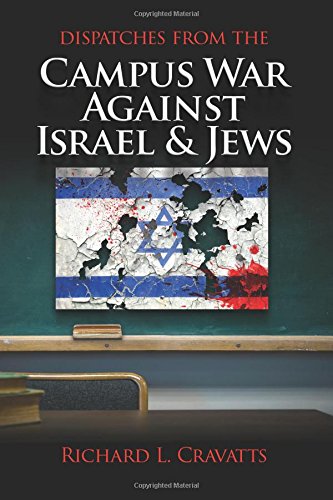Richard Cravatts is a man who knows his subject well. A former professor, former president of Scholars for Peace in the Middle East (SPME) and author of Genocidal Liberalism: The University’s Jihad Against Israel and Jews (2012), Cravatts has had his eye on the campus scene for many years now, and a discerning eye it is — one that does not much like what it sees. A collection of some 36 of his articles written over the course of the past few years, Dispatches presents a detailed picture of the uncomfortable, hateful and sometimes even threatening environment confronting Jews on campuses across the United States, particularly those Jews supportive of Israel. While the book does not exactly paint a cheerful picture, what it has to say is essential for anyone interested in these issues. It is by turns upsetting, disturbing, horrifying — and consistently gripping.
The book is divided into three parts. In the first, “The Ideology of Academic Israel Hatred,” Cravatts describes the many pseudo-intellectual ways that anti-Israel faculty members cast aspersions upon the Jewish state, cloaking straightforward antisemitism in the garb of academic jargon. We learn about “academic lies and distortions,” “the academic Nazification of Israel” and some “moral psychosis in the demonization of Israel.” We learn how the “progressive left” that has come to utterly dominate the academy has made anti-imperialism, anti-racism and anti-capitalism its major tenets, and then, with stunning academic negligence (at best) or simple Jew-hatred (at worst), has determined that Israel is the greatest violator of these principles that the world has ever known. The “lie of academic free speech” reveals how openly the academy now embraces the most hateful slanders of Israel and of Jews (“apartheid,” “ethnic cleansing,” “genocide,” etc.), does not even quiver when calls for the murder of Jews are uttered on campus (“Long live the intifada!” “From the river to the sea, Palestine will be free!”), yet regularly permits the disruption and shut-down of the occasional pro-Israel campus voice.
Cravatts focuses here on the manifestations of BDS within professional academic organizations. We learn about the tactics and (mostly) successes of BDS within the Modern Language Association, the American Studies Association and the Women’s Studies Association, the latter two of which have passed BDS resolutions, while the MLA is scheduled to vote on it within the next year. Among the themes here are: (1) how professional scholars, who normally care about arguments, evidence and hearing “both sides,” take utterly one-sided approaches to the Israeli-Palestinian conflict and assert outright falsehoods in their charges; (2) how loudly these activists complain they are being “silenced” whenever they are criticized for their hateful actions; (3) how something has gone profoundly wrong when a “Women’s Studies” association chooses to attack Israel, which shares western progressive values about the status of women, and instead supports the agenda of those whose societies deny women many key human rights, treat them as property and feature tremendous violence toward them. The intellectual acrobatics and inversions are so extreme that it is hard to avoid the conclusion, with Cravatts, that straightforward antisemitism is in play here.
Part Three takes us into the belly of the beast, providing the many “Campus Case Studies” of very disturbing events regarding Israel and Jews that constitute the bulk of the book: Arizona State, New York University, University of California at Davis, Irvine, Los Angeles, San Diego, and Berkeley, University of Minnesota, City University of New York, Northeastern, Stanford, Brandeis, Harvard, Yale, the University of Chicago, Boston University, Oberlin, Vassar, Wesleyan, etc. We learn about the hostile disruptions and shut-downs of speakers, the vicious BDS resolutions and acrimonious debates, the mock “apartheid walls” and checkpoints, the mock eviction notices, the extended hatefests known as “Israeli Apartheid Week,” the campus speakers and films spreading vitriolic slanders about Israel, calls for intifada, and so on.
The common themes include: support of free speech to lie about Israel, but suppression of free speech either to reject those lies, express concerns about their antisemitic nature or to support Israel; support for “resistance” (i.e. violence against Jews); and administrative efforts to provide every succor to protected classes of students (including the anti-Israel activists), while providing nothing to the Jewish students who must endure this harassment all semester long. Most common of all to these events, of course, is the group Students for Justice in Palestine, now with some 170 campus chapters nationwide, which takes the lead on many campuses.
These case studies are chilling. Cravatts successfully conveys not merely what it feels like to be a Jewish student supportive of Israel confronting all this, but also something more: what it feels like to be a sane, rational, fair-minded person in an allegedly enlightened environment — where being enlightened increasingly means being irrationally filled with raging and grossly unfair hate toward the Jewish state. If nothing else, this book will convince you to reach out to Jewish students everywhere and offer your support.
Overall, Dispatches is an invaluable resource for anyone who wants to get quickly up to speed on the frightening state of things on today’s campuses — and get motivated to do something about it.


